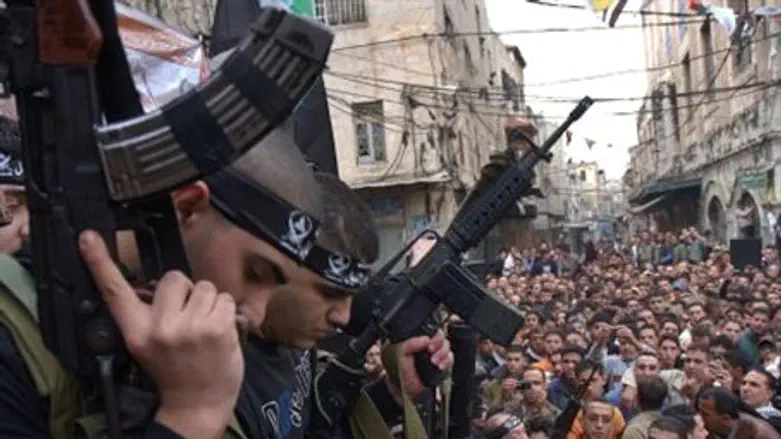
The current rebellion, mayhem and ensuing violence in Tunisia serves a warning against rushing into establishing the Palestinian Authority as a new Arab country without proper security guarantees, Prime Minister Binyamin Netanyahu warned Sunday.
The Palestinian Authority, which is severely split by warring factions, including Hamas and Fatah, is struggling to build institutions that would support it as a de facto state, but its security establishment has increasing been accused of turning the PA into a police state.
The fragile situation in Ramallah precludes the PA's becoming a stable country under the present circumstances, Prime Minister Netanyahu said. "We need to lay the foundations of security in any agreement that we make," he explained. "We cannot simply say 'We are signing a peace agreement,' close our eyes and say 'We did it,' because we do not know with any clarity that the peace will indeed be honored.”
PA senior negotiator Saeb Erekat accused Netanyahu of using Tunisia's violence as an excuse to refuse PA demands for establishing itself as a new nation within Israel’s current borders. "If there was a tsunami in Asia, a flood in Latin America or a lunar eclipse, Netanyahu would use it as a pretext not to negotiate," he said. The PA has used the term ”negotiate" to mean Israel’s surrender of all the land in Jerusalem, Judea and Samaria and that was restored to the Jewish State in the Six Day War in 1967.

The chaos in Tunisia has left dozens killed, wounded hundreds and sparked fears of similar uprising in the Arab world. Although the Tunisia rebellion was considered a psychological inspiration and may be a sign of a time bomb in Muslim countries, its explosion is not considered imminent.
Thousands of Jordanians demonstrated in several cities following the revolt in Tunisia. The protesters’ calls for the overthrow of the kingdom were unprecedented but did not represent a massive upheaval. Significantly, the radical Muslim Brotherhood did not participate, and university students were not noticeable, but Arab media reported that King Abdullah surrounded his palace with tanks as a precaution.
In Tunisia, Prime Minister Mohamed Ghannouchi said he may announce a coalition government Monday. It followed a month of protests, culminating in Zine El Abidine Ben Ali’s fleeing the country for Saudi Arabia. He was the first Arab leader to be forced out of office since a coup in Sudan 15 years ago.
Corruption, unemployment, rising prices and oppression are widespread in Arab countries. Growing unrest in Greece and other European countries have been cited by many observers as a warning of what may be in store for the rest of the world where economies are suffering, regardless of whether they are democracies or autocracies.
In Egypt, activists celebrated the Tunisian rebellion, but no violence was reported. A protest of several hundred people in Yemen ended peacefully, but Algeria was stunned by a spate of suicide attempts. One man died after setting himself on fire to protest social and economic conditions.